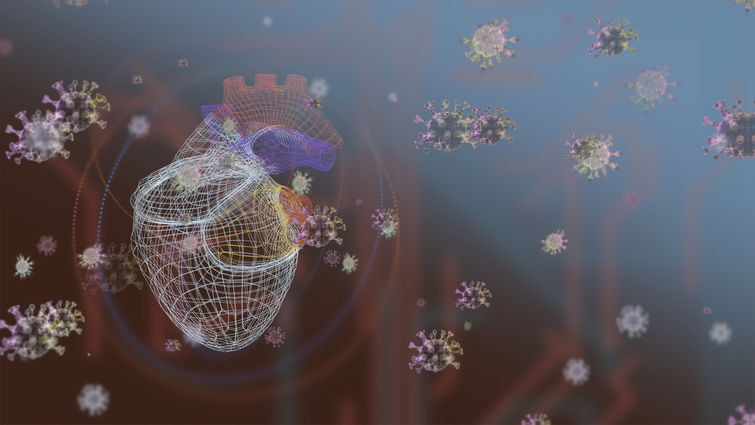
While COVID-19’s impacts on the lungs are evident, scientists and physicians are discovering ways the virus also presents significant challenges for the heart.
Moreover, COVID-19-induced cardiovascular damage affects not only those with severe symptoms but also people displaying mild to no COVID-19 symptoms at all, according to the Centers for Disease Control and Prevention.
Purvi Parwani, MD, a cardiac imager specializing in cardiac magnetic resonance and the director of Loma Linda University International Heart Institute’s Women’s Heart Health Clinic, says, “The heart complications brought on by the coronavirus can occur in anyone infected with the virus, not necessarily just patients who are hospitalized or have pre-existing heart conditions.”
What you should know about COVID-19’s impacts on the heart
COVID-19 may negatively affect the heart in a variety of ways, leading to symptoms of chest pain, arrhythmias (irregular heartbeat rhythms), or complications like heart failure and cardiogenic shock in patients from all walks of life and diverse health profiles.
COVID-19 doesn’t always involve the heart; but when it does, the most commonly detected cardiovascular impact of COVID-19 observed in both symptomatic and asymptomatic patients is an exaggerated inflammatory response triggered by the virus, known as myocarditis. In one study, nearly 80% of the examined COVID-19 survivors had heart abnormalities — chiefly suggestive of inflammation — that were detectable on magnetic resonance imaging (MRI) scans two months after infection. Overall, the findings of generalized inflammation in the heart are called COVID myocarditis. The study concluded a high rate of COVID myocarditis based on cardiac MRI findings in patients who recently recovered from COVID infection.
Viruses are not typically studied post-viral infection, Parwani notes. COVID-19 effects on the heart, however, were studied using cardiac MRI. This area perhaps needs more research to see how COVID-19 is different than other viruses. But given that the cardiac MRI studies show ongoing inflammation, it’s reasonable to get medical attention for patients with lingering symptoms.
How COVID-19’s impacts on the heart are detected
Physicians are using the latest cardiovascular imaging technologies, particularly cardiac MRI, to identify the type and intensity of patients’ heart damage from COVID-19. Loma Linda University’s International Heart Institute offers the following tests and screening options, which enable insights into the heart’s condition during and after COVID-19 infection.
- Magnetic resonance imaging (MRI)
- Transthoracic echocardiographic (TTE) scan
- Electrocardiographic (ECG) scan
- Echocardiography
- Arrhythmia screening
- Other cardiac imaging
What can you do if you have COVID-19 infection and are worried about your heart
If you are a patient with a heart condition who is at home and asymptomatic of COVID-19, Parwani advises to quarantine during the course of illness, continue taking cardiac and blood pressure medicines and consult with a physician if symptoms worsen.
She lists some symptoms warranting a medical consultation, including: increasing or extreme shortness of breath with exertion, chest pain, swelling of the ankles, heart palpitations or an irregular heartbeat, not being able to lie flat without shortness of breath, waking up at night short of breath, lightheadedness or dizzy spells.
Be especially careful about resuming exercise after having COVID-19 or another infection, Parwani says. For additional information, follow this guide to resuming strenuous physical activity following a COVID-19 infection.
While the long-term significance of COVID-19’s cardiovascular effects have yet to be determined, the Centers for Disease Control and Prevention says multi-year studies are already underway. Ongoing efforts to study the coronavirus and its complex effects on the human body contribute to a growing understanding of the virus and more informed health choices and treatments moving forward.
If you are a patient who suffered from a COVID-19 infection and continue to experience cardiovascular symptoms, experts at Loma Linda University’s International Heart Institute are at your service to evaluate you and advise you on the appropriate tests and screenings for your health. If you or your family are concerned about COVID-19’s lingering effects on the heart, schedule an appointment with one of our experts at the COVID Heart Clinic by calling 1-800-468-5432 or ask your primary care provider to place a referral to LLU International Heart Institute’s COVID Heart Clinic.
